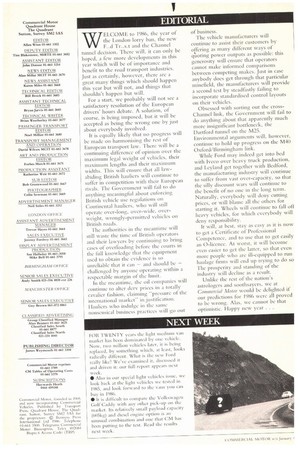W ELCOME to 1986, the year of the London lorry ban,
Page 2

If you've noticed an error in this article please click here to report it so we can fix it.
the new F. .d Tr..s.t and the Channel tunnel decision. There will, it can only be hoped, a few more developments in this year which will be of importance and benefit to the road transport industries. Just as certainly, however, there are a great many things which should happen this year but will not, and things that shouldn't happen but will.
For a start, we probably will not see a satisfactory resolution of the European drivers' hours debate. A solution, of course, is being imposed, but it will be accepted as being the wrong one by just about everybody involved.
It is equally likely that no progress will be made on harmonising the rest of European transport law. There will be a continuing difference of opinion over the maximum legal weight of vehicks, their maximum lengths and their maximum widths. This will ensure that all lawabiding British hauliers will continue to suffer in competition with their European rivals. The Government will fail to do anything meaningful about enforcing British vehicle use regulations on Continental hauliers. who will still operate over-long, over-wide, overweight, wrongly-permitted vehicles on British roads.
The authorities in the meantime will still waste the time of British operators and their lawyers by continuing to bring cases of overloading before the courts in the full knowledge that the equipment used to obtain the evidence is so unreliable that it can — and should be — challenged by anyone operating within a respectable margin of the limit.
In the meantime, the oil companies will continue to alter dery prices in a totally cavalier fashion, claiming "pressure of the international market" in justification. I lauliers who indulge in the same nonsensical business practices will go out of business.
The vehicle manufacturers will continue to assist their customers by offering as many different ways of quoting power outputs as possible: this generosity will ensure that operators cannot make informed comparisons between competing makes. Just in case anybody does get through that particular minefield, the manufacturers will provide a second test by steadfastly failing to incorporate standardised control layouts on their vehicles.
Obsessed with sorting out the crossChannel link, the Government will fail to do anything about that apparently much more insignificant bottleneck, the Dartford tunnel on the M25. Environmental arguments will, however, continue to hold up progress on the M40 Oxford/Birmingham link.
While Ford may indeed get into bed with lveco over heavy truck production, and Leyland get together with Bedford, the manufacturing industry will continue to suffer from vast over-capacity, so that the silly discount wars will continue to the benefit of no one in the long term. Naturally, everybody will deny cutting prices, or will blame all the others for starting it. Wheels will continue to fall off heavy vehicles, for which everybody will deny responsibility.
It will, at best, stay as easy as it is now to get a Certificate of Professional Competence, and to use that to get easily an 0-licence. At worst, it will become even easier to get the latter, so that even more people who are ill-equipped to run haulage Firms will end up trying to do so The prosperity and standing of the industry will decline as a result.
Unlike the rest of the nation's astrologers and soothsayers, we at Commercial Motor would be delighted if our predictions for 1986 were all proved to be wrong. Alas, we cannot be that optimistic. Happy new year . . .


































